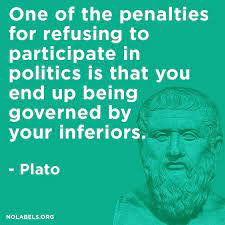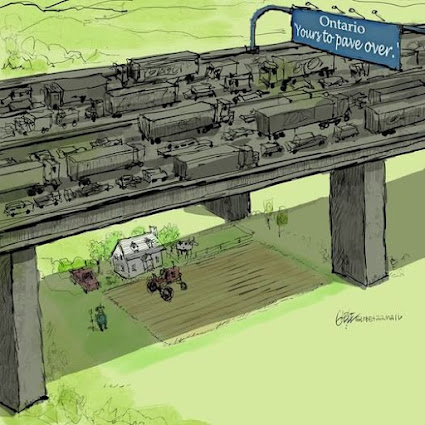They called the election before all the polling places were closed because Ford had that much of a lead. My first thought this morning:
"Realizing what a bubble I'm in online and in real life. I don't know a single person who would consider voting PC. I'm blown away that cuts to healthcare, profit-driven LTC, no autism services, online ed, paved over farmland, etc. is what Ontario actually wants."
Many were quick to point out that it's not what Ontario wants, but possibly just the 18% of eligible voters who actually voted for Ford. It helps to know that 25% of people voted against Ford, and the big surprise - sort of - is that 57% didn't vote at all. I was all in a tizzy about this one, yet lots and lots of people just stayed home.
Can you blame them?
We've clearly got a problem with our first past the post system, though, which might be enough for people to take a pass at the whole thing. A few Liberals and NDP politicians, including Trudeau, promised to resolve it once they got in but then got busy with other things. It's a system that can benefit the larger parties, so we can see why Liberals would promise it then renege on it, but it invites gerrymandering and can produce results very different than the popular vote would suggest. Worse, it can make people feel like their vote didn't really count.

There could be access problems that made voting difficult this time, whether by misfortune or design. Anecdotally, I've heard that some polling stations closed earlier than expected (3:30 instead of 9:00) or were moved at the last minute or had technical difficulties. Some people claim they were able to vote without showing ID and others were turned away because they were listed as having already voted. Some claimed their polling station was in the next town, nowhere near public transportation, and many long time voters didn't get a voting card in the mail. All of this is hearsay, but there's enough of it floating around to raise some alarm bells about possible shenanigans. And I wouldn't put it past this group to go down that road.
There have been calls to fix the system by lowering the voting age to 16, which would get more NDP supporters in the voting pool. It's a curious solution because the 18-24 demographic consistently has the lowest voter turnout. It won't help to give them the vote if they won't use it anyway.
I've been organizing the Student Vote (a CIVIX program) at my school since they started crafting their phenomenal learning resources and facilitating country, province, and municipal-wide votes of all school age children, from Junior Kindergarten to grade 12, for almost twenty years. Most years I've had kids come to the front hall to vote with paper ballots, my civics class running the show. Since Covid, I started doing it online. In person, I could usually count on about 60% of the school voting mainly because teachers would bring down their entire class on a schedule throughout the day, which only worked because we were an MSIP school with a supervised spare built into the day - perfect for just this kind of thing. (MSIP was somehow a casualty of our return to normalcy.) For the federal election last September, online, I was still able to get about 35% of the school participating. Yesterday, for our provincial election, I got 6% voting. Six percent! That means 2-3 classes stopped what they were doing for a few minutes, and students were walked through how to vote then given time to click on their chosen candidate on the ballots with a teacher circulating for support. So, yup, apathy. I wonder how much of a difference it makes that the election was June instead of September. We're game for anything at the start of the school year, but now we're just counting the days, and anything extra is asking way too much.So maybe the solution is to make voting mandatory, like they have in Australia. We'd still have an option to refuse our ballot, but we have to at least make an effort to get there. But you can lead a horse to water...
Wouldn't it be nice if somehow more people thought they could make a difference enough that they wanted to vote?
One of my favourite bits of Rousseau comes to mind whenever I'm dreading a staff meeting, where discussion is never raised, and teachers rarely heard:
"In a well-conducted city, each member flies with joy to the assemblies; under a bad government, no one is disposed to bend his way thither, because no one is interested in proceedings where he foresees that the general will will not prevail, and in the end every man turns his attention to his own domestic affairs."
How do we get to the masses to fly with joy to watch the debates??
To their credit, Conservatives spoke to their base and got them out to the polls. For all the things I hate about Ford, he's good with the slogans and buzzwords and the folksy language, like Trump was, and people react to that. We need leaders who are inspiring and energizing, and we didn't get that with the others.
When many students don't submit an assignment, I take a good look at what I've created and try to re-work it into something that's more meaningful for them until I get better engagement. That's on me. Elections are the same bullshit stories and attacks on one another that are too hard to follow without a knowledge of a good ten years of backstory that many people don't have rattling around up there with their grocery list and kids' appointments. I tried to watch one debate, but the candidates all spoke at once, picking away at each other, which was far too frustrating to manage for more than 15 minutes or so. For first time voters, the information to understand about how it all works is dense and necessarily all at once, right before the election, which can be tricky to impart in an entertaining way. Getting civics classes to do the student vote, and making them aware they'd have to answer questions if someone doesn't understand the process is a great way to develop authentic learning, but not every class can have that opportunity. If the candidates are dull or annoying, then the election is a write-off. It shouldn't hinge on charisma, but it does.
Media also helped Ford along by suggesting it was all a done deal, which might have persuaded some to stay home. Since the change in guard at the Toronto Star, it sometimes feels like The Beaverton is the only left leaning Canadian mag (but do check out The Walrus, The Narwhal, and The Tyee). Here's their headline today:
Some are convinced that the corporations are running the show anyway, so what does it matter. Contractors clearly have Ford's number, but we might have gotten a better deal with the other front-runners. There are many little things that Ford will whittle away by dribs and drabs that might have been saved by the Liberals or NDP.
So expect school strikes in September as contracts are up for renewal, and that won't be pretty. Try to keep your elders out of privatized LTC homes. Plant a tree for the environment since a big chunk of it will be destroyed soon. Really try not to get sick or have an accident because healthcare is only going to get worse and more expensive. And maybe get a line on some mifepristone, just in case we lose abortion access with some of these rabid wingnuts. Oh yeah, and Covid is still running rampant, and monkeypox is growing in Quebec, so keeping wearing a mask because Dr. Moore has evaporated, and Ford's going to keep ignoring this pandemic. 100 people in Ontario died in the last ten days. RIP.
Rousseau said, in his argument for a direct democracy:
"When, therefore, the motion which I opposed carries, it only proves to me that I was mistaken, and that what I believed to be the general will was not so."
Nope. He's wrong on that one! The motion we opposed carried, but it was not the general will.




No comments:
Post a Comment